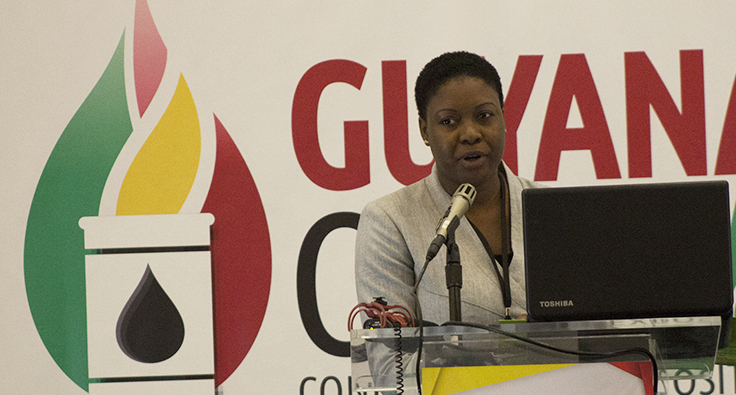With oil production set to begin in Guyana by 2020, the country’s Environmental Protection Agency (EPA) said it expects to be fully consulted on environmental management and sustainable use of the South American nation’s natural resources.
EPA’s representative, Aminah Damon, who spoke at Guyana’s inaugural Oil and Gas Conference and Exposition held in March at the Guyana Marriott Hotel, expressed the hope that the Agency’s mandate would be accomplished through the sharing of data, capacity-building, coordination and collaboration with the private and public sectors, Non-Governmental Organizations and sector agencies. She noted that this was necessary and significant during the process of creating effective regulations and policies which come on stream in any country with oil and gas industries.
The EPA operates within the ambit of the Environmental Protection Act Chapter 20:05 legislated in Guyana in 1996. It addresses areas of environmental management and sustainable use of natural resources with its mandate being to provide for the effective management, conservation, protection and improvement of the environment, the prevention and control of pollution and the assessment of the impact of economic development on the environment.
Already, questions have arisen by concerned environmentalists as to how Guyana will be able to effectively draw the line between having a successful oil and gas industry while at the same time effectively managing effects on its environment, with a small population of approximately 750,000. The country has already faced challenges with the adverse effects of mineral extraction on land and complaints of damage to the forest and pollution of the environment. Guyana’s rainforest remains one of the most pristine in the world.
Many have noted that despite the expectation that the nation would benefit from oil production, this progress comes with a price tag through risk to the environment and health.
Recently, one individual expressed concern in the media that ‘drilling for oil in the waters of our continental shelf, located in the Amazon River Basin, and which hosts pristine ecosystems, can be disastrous in case of an explosion as we witnessed in the Gulf of Mexico in 2010’.
Citing a number of the provisions in the Environmental Protection Act and the penalties for breaching these provisions, the EPA representative underscored the importance of these provisions being adhered to especially in relation to prospective developmental oil and gas projects.
“The Environmental permit takes precedent over other development consent. Section 14 (1) of the EPA Act prohibits other public agencies responsible for issuing development consents in relation to matters where an environmental authorization is needed. For example, before exploration and development activities can occur, the operator must obtain an environmental authorization before Agencies such as GGMC can give development consent. This is just a brief example that the agency has to first give consent before any other sector agency permits any project. “
She added that the Environmental Protection Act creates the basic institutional and regulatory framework within which all activities that may/may not have significant impact on human health, natural, social and cultural environment, are governed.
However, the EPA representative noted, “persons may ask the question as to whether these regulations are sufficient to deal with the upstream oil and gas sector. This has been a debate by itself. Nevertheless, Section 68 (1) of the EPA Act empowers the subject Minister to enact regulations to articulate specific areas of environment management as he deems fit. “
The EPA was one among a number of other stakeholder bodies invited to participate in the inaugural oil and gas Conference hosted by the Guyana Oil and Gas Association (GOGA).
Only recently, the 2016 Environmental Performance Index (EPI), a Yale-based initiative that evaluates how 180 countries around the world protect ecosystems and human health, ranked Guyana as 6th in terms of the country’s ‘Air Quality’.




Stop focusing on the the oil gas alone they are many other issue that the every day lives of Guyanese
Just take a look at BANKS DIH and the pollution to the environment